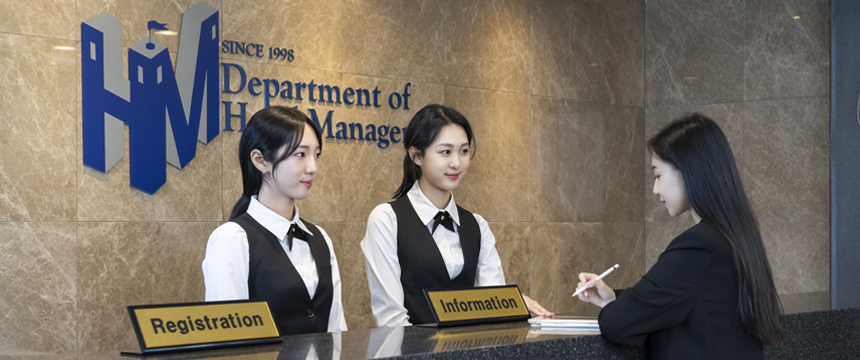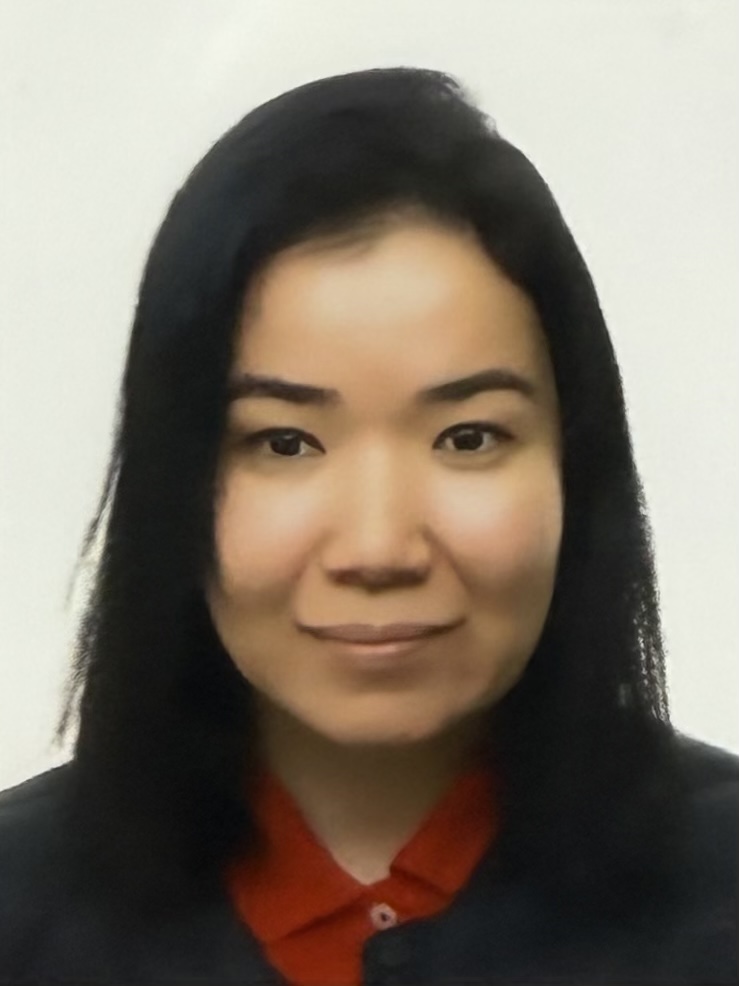
- Name-
- Phone-
- Phone-
- Fax-
Introduction to the Department
The Master of Arts in Global Hospitality Management (MGHM) Program aims to cultivate future leaders with knowledge and skills to succeed in the global hospitality industry. The curriculum comprehensively encompasses all aspects of hospitality management from advanced operational skills to strategic planning and international market trends. The M.G.H.M. Program emphasizes practical experience through apprenticeship, industry partnerships and global case studies. Students prepare them for the challenges of a rapidly changing industry, exploring key areas such as sustainable tourism, innovative technologies and effective leadership.
Goals of Education
The M.G.H.M. Program is to develop skilled and innovative leaders who can succeed in the global hospitality industry. The program has the following goals:
- 1Enhanced Knowledge: Providing a comprehensive understanding of advanced hospitality management principles, including operational excellence, strategic planning and international market trends.
- 2Developed Practical Skills: Developed practical skills in a variety of areas including sustainable tourism, technological advancement and effective leadership through apprenticeship, case studies and industry partnerships.
- 3Developed Global Perspectives: Enhanced ability to respond and lead effectively in diverse global environments, addressing unique challenges and opportunities in diverse cultural and market contexts.
- 4Fostered Innovation: Encouraging creative problem-solving and innovative thinking in response to emerging trends and issues.
- 5Developed Leadership Skills: Developing strong leadership and management skills that drive success and sustainability across a range of the hospitality industry, including hotels, resorts and tourism business.
Our goal is to prepare graduates to effectively manage and lead in a changing global hospitality environment and contribute to the growth and success of the industry.
Program Features
The M.G.H.M. Program is distinguished by its comprehensive and integrated curriculum that covers all the important aspects of global hospitality. It covers everything from advanced operations management to strategic planning, and emphasizes apprenticeship, case studies, and industry partnerships that connect theoretical knowledge to practical experience. With a global perspective, students gain insight into international hospitality trends and practices, and are prepared to manage effectively in a variety of environments. The latest technological advancements, such as CRM systems and AI applications, ensure that graduates are proficient in essential digital tools. Additionally, the focus on sustainability ensures that students are prepared to lead initiatives that align with global environmental goals.
Career Path after Graduation
- 1Hotel General Manager
- Oversees departments such as Human Resources, Sales, and Operations to ensure smooth hotel operations. - 2Public Relations Manager
- Promotes the brand through media relations and social media. - 3Restaurant Manager
- Manages food service operations to maintain quality and profitability. - 4Cruise Director
- Oversees onboard entertainment, hotel, and guest service. - 5Event Manager
- Organizes and operates events from planning to execution.
Each role requires a combination of leadership, organization, management, finance, marketing, strategy, digital technology, and communications skills.
Characteristics and Advantages of MGHM
Features of M.G.H.M. Program:
- The international faculty that provides students with a global perspective.
- A multicultural environment that helps students learn how to build relationships with people from diverse backgrounds.
- Well-established brands that provide diverse employment opportunities in Korea and abroad.
- Education from industry professionals who understand the real-world challenges in this dynamic industry.
The hospitality industry is one of the largest and most diverse industries in the world, with numerous job opportunities in hotels, restaurants, resorts, cruise ships, and other related fields. The hospitality industry has always relied heavily on the interaction between employees and customers. Today, the demand for well-trained hospitality professionals is greater than ever, especially in Asia, where many regions are developing into new and exciting tourist spots. Our Global Hospitality Management program turns passionate students into highly skilled employees that the industry needs. Unlike other programs in Korea, the curriculum is taught 100% in English, and all of our professors are foreign nationals.
Studying M.G.H.M. will teach you a variety of essential skills that are valuable in any industry. These skills include communication, customer service, problem-solving, teamwork, and leadership. These skills are essential to success in any career, and can be especially useful in the hospitality industry, where customer service is a top priority.
Lastly, studying the M.G.H.M Program can be an excellent way to gain the skills and knowledge needed to succeed in the exciting and dynamic hotel industry. With a variety of career opportunities, opportunities to develop essential skills, practical experience opportunities, networking opportunities, job security and advancement opportunities, studying hotel management can be wise investment in your future career.
Faculty (MGHM)

Professor
- phone 041-580-3562
- E-mail alek@nsu.ac.kr
- Research Field Management

Professor
- phone 041-580-5367
- E-mail iroda@nsu.ac.kr
- Research Field Hotels and Tourism
Curriculums
-
Introduction to Hospitality and Tourism Management
This course offers a detailed exploration of the global hospitality and tourism industry in both Korean and international markets.
Students will learn core principles of hospitality management such as customer service, operations, and cultural awareness.
The curriculum includes sustainable tourism, the economic impacts of tourism, and destination management.
Through case studies and practical exercises, students will gain insights into managing hotels, resorts, and other tourism-related businesses.
This foundational course is essential for understanding the dynamics of the hospitality industry. -
Korean Culture and Global Heritage Tourism
This course explores both Korean culture and global heritage and their significance in the tourism industry.
Students will examine traditional Korean customs, historical sites, and cultural festivals alongside global heritage tourism practices.
The curriculum includes developing and promoting cultural tourism products and experiences that cater to a diverse international audience.
Field trips to cultural heritage sites in Korea and virtual tours of global sites, along with interactions with industry experts, provide practical insights.
By understanding cultural assets from both Korean and global perspectives, students will be equipped to enhance the visitor experience and promote cultural tourism effectively. -
Food and Beverage Management
This course focuses on the management of food and beverage operations within the hospitality industry.
Students will study the fundamentals of menu planning, cost control, food safety, and service quality.
Emphasis is placed on understanding the diverse culinary traditions of Korea and how to cater to international guests.
Practical sessions include restaurant simulations and visits to leading food and beverage establishments.
Graduates will be prepared to manage restaurants, cafes, and catering services efficiently -
Wine Studies and Sommelier Training
Exploring the world of wine through this comprehensive course designed for aspiring sommeliers and wine enthusiasts, students will learn about the history of wine, grape varieties, wine production processes, and wine regions globally, along with an understanding of Korean wines.
The course includes wine tasting sessions, food and wine pairing techniques, and insights into wine marketing and sales.
Industry experts and sommeliers will provide hands-on training and guidance.
This course is ideal for those aiming to enhance their wine knowledge and service skills in the hospitality industry. -
Barista Skills and Coffee Culture
The course delves into the art and science of coffee making for future baristas and coffee shop managers.
Students will learn about coffee bean origins, roasting processes, brewing techniques, and the cultural significance of coffee in Korea and around the world.
Practical training includes espresso preparation, latte art, and the management of a coffee business.
The course also covers customer service excellence and the creation of a unique coffee shop experience.
Graduates will be well-prepared to excel in the competitive coffee industry -
Event Planning and Management
This course provides a comprehensive overview of event planning and management within the hospitality and tourism sectors.
Students will learn the essentials of organizing successful events, from small corporate meetings to large international conferences and weddings.
Topics include event design, budgeting, marketing, and risk management.
Practical projects and collaborations with industry professionals offer hands-on experience.
This course equips students with the skills needed to create memorable and seamless events -
Sustainable Tourism Practices
: Focusing on the principles and practices of sustainable tourism, a critical aspect of modern hospitality management, students will study the environmental, economic, and social impacts of tourism and how to develop sustainable tourism strategies.
The course includes case studies of successful sustainable tourism initiatives in Korea and globally.
Topics covered include eco-tourism, community-based tourism, and green certification programs.
Students will learn to balance tourism development with environmental conservation and community well-being. -
Digital Hospitality and Technology Management
This course explores the role of technology in modern hospitality management.
Students will learn about various digital tools and systems used in the industry, such as property management systems, online booking platforms, and customer relationship management software.
The curriculum covers the impact of technology on guest experiences, data security, and the integration of innovative solutions like AI and IoT in hospitality operations.
Practical sessions include demonstrations and hands-on use of industry-standard software.
Graduates will be adept at leveraging technology to enhance operational efficiency and guest satisfaction -
Marketing for Hospitality and Tourism
This course delves into the marketing strategies and techniques essential for the hospitality and tourism industry.
Students will learn about market research, consumer behavior, digital marketing, and branding.
Emphasis is placed on creating effective marketing campaigns that attract and retain guests.
Practical assignments include developing marketing plans for real-world hospitality businesses.
The course prepares students to navigate the competitive landscape of hospitality marketing successfully.